As many commentators have pointed out over the last several years, Sochi is hardly an ideal place to hold the Olympics, given its proximity to the unsettled North Caucasus and the anger of that region's residents about Moscow's decision to destroy ecological and historical sites dear to them in order to host the Games.
Paul Goble is a longtime specialist on ethnic and religious questions in Eurasia. Most recently, he was director of research and publications at the Azerbaijan Diplomatic Academy. Earlier, he served as vice dean for the social sciences and humanities at Audentes University in Tallinn and as a senior research associate at the EuroCollege of the University of Tartu in Estonia.
Prior he served in the U.S. State Department, the Central Intelligence Agency and the International Broadcasting Bureau, as well as at Voice of America and Radio Free Europe/Radio Liberty and at the Carnegie Endowment for International Peace. Mr. Goble can be contacted directly at paul.goble@gmail.com
But if in the past Moscow officials have repeatedly stressed their ability to ensure security at those Games, now the head of the FSB is saying there is a definite terrorist threat. And while Alexander Bortnikov's statement last week is almost certainly true, the timing of his remarks highlights what Moscow appears to be most concerned about &mdash covering up corruption.
That is because in the last several weeks ever more evidence has come out that, as one Russian news service headlined its report Monday, "corruption is making the Sochi Olympics the most expensive in history," a charge that could have the effect of leading more people to question the appropriateness of holding the Games there.
But by invoking the threat of terrorism, Bortnikov and presumably the powers that be behind him raise the stakes not only for the Russian Federation but for the international community by implying that any retreat about the Sochi Games would be a concession to the terrorists, something neither Russians nor Western governments are prepared to do.
Last Thursday, Bortnikov said his agency had information that "terrorists intend to blow up the Olympiad in Sochi in 2014," the kind of threat that has already forced the cancellation of the Dakar 2008 rally and one that "exerts serious influence on political decisions.
The FSB chief suggested that such attacks reflect a change in strategy and tactics by international terrorist structures. Now, he said, "they ever more actively use in their interests radicalism and extremism and seek to master the latest technologies and gain access to elements of weapons of mass destruction."
And Bortnikov added that there are "at times direct support of the terrorists from the side of particular political forces that are attempting to use them in their goals," a charge that many analysts immediately saw as preparing the ground for more attacks on militants in the North Caucasus.
That is quite possibly the case, but if so, Bortnikov's timing suggests that it is far from his only concern. Today, for example, the New Region news portal posted an article about recent stories concerning the cost of the games under the title "Corruption is Making the Olympiad in Sochi the Most Expensive in History".
Drawing on reporting by Nezavisimaya Gazeta, New Region's Olga Panfilova writes the projected costs of the 2014 Sochi Games are 10 times as large as those of past games and 2 1/2 times the original plan, largely the result of poor planning and construction shortcomings, an unfortunate location and massive corruption.
Natalya Zubarevich, the director of regional programs at the Moscow Independent Institute of Social Policy, said the extraordinarily high costs were the result of "ineffectiveness and corruption. We do not know how to build inexpensively and high-quality objects."
Aleksei Skopin, deputy head of the regional economics department at the Moscow Higher School of Economics, was more negative. He suggested that of the 39 billion US dollars Moscow may allocate to Sochi, 30 billion of them will represent a kind of tax "which we in fact will pay to bureaucrats, criminals and all those who participate in the realization of the games."
According to Nezavisimaya Gazeta, Panfilova continues, "independent experts have not seen a real business plan for the conduct of the Olympic Games" in Sochi. As a result, it is impossible to know just where the money is coming from and where it is going, something that clearly works to the benefit of corrupt officials.
Indeed, the experts suggest, the rapid growth in spending on Sochi is a means that has been adopted by the powers that be to exclude society from any role in "the control over public finances," a conclusion that, if true, makes the consequences of the Sochi Games already a major loss for Russia regardless of how many medals its athletes might eventually win.
Meanwhile, The New Times provides additional details about corruption in the Sochi project. In London's Sunday Times, Russian businessman Valery Morozov accused Vladimir Leshchevsky, an official of the Administration of Affairs of the Presidential Administration, of taking major bribes to approve Sochi construction.
In his interview, which was picked up by Novaya Gazeta, Morozov said Leshchevsky had demanded a bribe equal to 12 percent of a 1.5 billion ruble ($47 million) Sochi construction project, a bribe that Morozov says he paid but that Leshchevsky has denied receiving.
Leshchevsky is close to Prime Minister Vladimir Putin. In 2003, The New Times notes, Putin awarded him the Order of Friendship for his role in the celebration of the 300th anniversary of St. Petersburg and international summits, events that some observers earlier have suggested involved corruption as well.
A Message from The Moscow Times:
Dear readers,
We are facing unprecedented challenges. Russia's Prosecutor General's Office has designated The Moscow Times as an "undesirable" organization, criminalizing our work and putting our staff at risk of prosecution. This follows our earlier unjust labeling as a "foreign agent."
These actions are direct attempts to silence independent journalism in Russia. The authorities claim our work "discredits the decisions of the Russian leadership." We see things differently: we strive to provide accurate, unbiased reporting on Russia.
We, the journalists of The Moscow Times, refuse to be silenced. But to continue our work, we need your help.
Your support, no matter how small, makes a world of difference. If you can, please support us monthly starting from just $2. It's quick to set up, and every contribution makes a significant impact.
By supporting The Moscow Times, you're defending open, independent journalism in the face of repression. Thank you for standing with us.
Remind me later.






